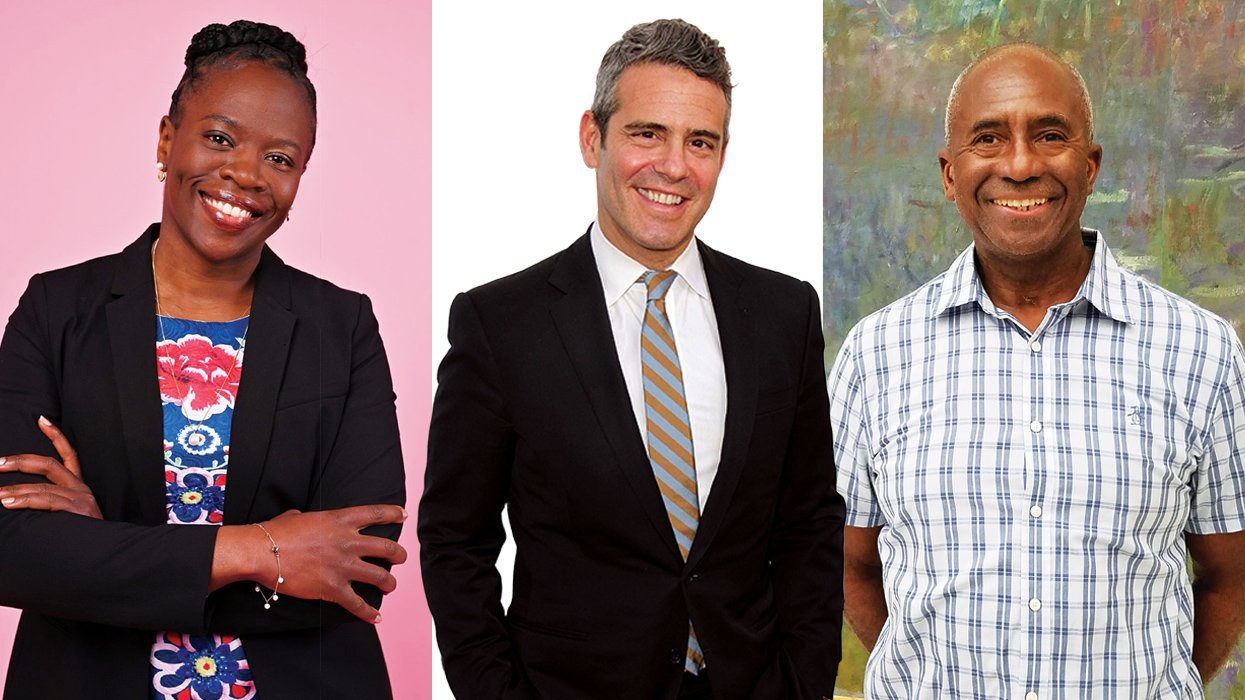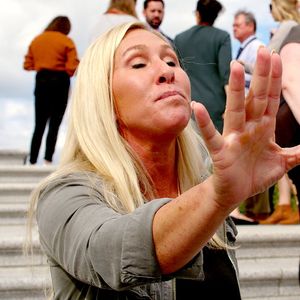
Treatment GuideJust DiagnosedSex & DatingAfrican AmericanStigmaAsk the HIV DocPrEP En EspañolNewsVoicesPrint IssueVideoOut 100
CONTACTCAREER OPPORTUNITIESADVERTISE WITH USPRIVACY POLICYPRIVACY PREFERENCESTERMS OF USELEGAL NOTICE
© 2024 Pride Publishing Inc.
All Rights reserved
All Rights reserved
By continuing to use our site, you agree to our Private Policy and Terms of Use.
When Nicole Guide and her fianc' get home from their respective days at work, he plops down in front of the TV. 'What do I do?' she says. 'I have to run up and down cleaning the house. After cleaning the house, I have to make sure that my 14-year-old daughter has something to eat. After she eats, I have to make sure I do all the dishes. After I do that, I have to make sure she does her homework.' HIV-positive for 18 years, Guide is a recovered crack addict living in Brooklyn, N.Y. At 43, she has turned her life around and now boasts a list of accomplishments including a bachelor's degree in performance and theater (with a master's degree in public administration in progress), an HIV advocacy nonprofit called Hope's Alive that she founded in 2003, and a 1999 citation from President Bill Clinton for her volunteer work. But she still finds it hard to figure out where her needs belong on her long list of obligations. 'Women definitely have it very, very difficult being HIV-positive, being as emotional as we are,' she says. 'And with all the excess stuff that we do as far as being a help maid to men, by the time it's time to take care of ourselves, we just pass out in the bed or something. We forget about us.' The October 2007 Women Living Positive survey has found that HIV-positive women like Guide are not always advocating for themselves as women. They are struggling to care for their HIV disease while performing the role of caretaker to their family. Nearly three quarters of the survey's 700 respondents reported that living with HIV made managing their everyday lives more difficult. The study, funded by Boehringer Ingelheim Pharmaceuticals, was designed in partnership with the Well Project, a nonprofit focused on advocating for the needs of women living with HIV. Get Your Needs Met The physician's office is a primary place where women need to take better charge of their health. Of those surveyed, 55% said they have not had conversations with their doctors about how their anti-HIV medications might affect them differently than men. The good news is that almost all women who do have such conversations with their HIV specialists are both satisfied with the information the doctor provides and comfortable having the discussion. Lady Kathryn Williams-Julien says her long history of domestic abuse at the hands of her late husband made it difficult for her to trust the male HIV specialist to whom she was assigned after she was released from prison in 2001. The 46-year-old had served three years after being convicted of second-degree manslaughter for the stabbing death of her husband during an altercation in 1997. 'It was difficult to discuss some of the intimacies of what was going on with my body because he was a male doctor,' recalls Williams, who lives in the Bronx, N.Y. 'I found that I was only doing myself a disservice, because I wouldn't keep my appointments, and then I wasn't adhering to my medications. So I went back to the hospital and told them I specifically wanted a female doctor.' Tony Mills, an HIV specialist in Los Angeles, says he can understand Williams's plight. Many doctors, he says, are not sensitive to the needs of women. 'That is why it is so important for patients to see an HIV specialist, and particularly for women to see a specialist who treats a fair number of female patients,' he says. 'I think it would be great for women to be proactive and ask their doctors, 'What specific things do I have to worry about being a woman living with HIV?'' Just for Women Housing Works, a New York City-based AIDS service organization, has made an effort to recognize the unique social and medical needs of HIV-positive women. To address these needs, the group opened a one-stop clinic and social services center for women in 2007. Danielle Benoit is the director of clinical services at the Women's Health Center. She recommends that women tap into the resources their clinic or doctor's office may already offer, such as a nurse or a case manager who can discuss medication adherence and the potential course of the disease. A nutritionist may also be on hand to talk about healthy eating. Advocates like her can even go along on visits to the doctor for moral support and to make sure the right questions are both asked and answered. 'Doctors serve as more of an authoritative figure' to many women, Benoit says, 'as opposed to a social worker, who you build a rapport with. [The social worker] begins the process of helping the client to empower themselves by becoming a partner in care.' One crucial area of discussion many HIV-positive women tend to avoid with their doctors is family planning. Fifty-seven percent of the Women Living Positive survey respondents who were or had been pregnant reported they had not discussed anti-HIV therapy options for a successful pregnancy before conceiving. About 6,000 HIV-positive women give birth each year in the United States, according to the Centers for Disease Control and Prevention, and there are medications that can greatly reduce the likelihood that the virus will be passed along to their baby. Safe, Not Sorry Nicole Guide says that when she was pregnant with her now-14-year-old daughter, she was silenced by the fear of how her doctor would judge her for getting pregnant in the first place. 'I think I went through the whole pregnancy without seeing a doctor,' she says. 'And that's how my daughter came out positive. We have to make a decision at that point: What is more important? Is it my shame and my fear of what this doctor is going to think about me? Or is it the health of the child?' Vaty Poitevien, an HIV specialist at one of Housing Works' satellite clinics, confesses she has been guilty of failing to provide a safe place for such discussions. 'It's very simple questions to ask the patient,' she says: '_'What are your plans? Do you want to have children?' Just asking questions like these, you humanize the patient. You tell her, 'You're still alive; you're not dead. You're a woman.'_' Today, Guide is trying to strike that delicate balance between caring for her family and remembering to take time for herself. Like 27% of the women surveyed, Guide suffers from depression, and she has been on Prozac for eight. She says it's the little things that count when it comes to propping up her feelings of self-worth. 'Just the other day, because of Christmas and buying things for other people and not thinking about me, I treated myself to a $30 steak,' she says. 'It wasn't about the $30. It was about spending all this money on everybody else and wanting to do something for me. Women have to pamper themselves, because if they don't, they lose sight of how important they are.' Williams says she regularly reminds her peers that 'a lot of women, especially women of color, need to understand that in order for us to take better care of our families, we have to make sure that our health and mental state is good. We worry about things in the future instead of focusing on our present state right now.'
Want more breaking equality news & trending entertainment stories?
Check out our NEW 24/7 streaming service: the Advocate Channel!
Download the Advocate Channel App for your mobile phone and your favorite streaming device!
From our Sponsors
Most Popular
Diets that mimic fasting reverse aging: study
March 07 2024 5:28 PM
Before AIDS, gay artist Rex drew hot men on the prowl — then he disappeared
April 11 2024 3:15 PM
The Most Amazing HIV Allies & Advocates of 2023
November 03 2023 12:51 PM
PrEP without a prescription now a reality in California
February 06 2024 8:37 PM
This OnlyFans Star Is Trying to Raise $100K to Fight HIV
December 26 2023 3:05 PM
Injectable HIV treatment, prevention: Everything you need to know
March 26 2024 3:28 PM
The naked Black body takes center stage in this HIV campaign
January 03 2024 1:07 PM
8 dating tips for gay men from a gay therapist
March 21 2024 2:50 PM
Mr. Gay World wants to make sure you're OK
January 02 2024 4:56 PM
Plus: Featured Video
Latest Stories
On Anal Sex Day, crack up with The Bottom's Digest
April 18 2024 10:22 AM
Todrick Hall has long supported the communities he comes from
April 17 2024 12:02 PM
Our May/June issue of Plus is here!
April 17 2024 12:00 PM
Giselle Byrd is taking center stage — and helping others do the same
April 10 2024 2:24 PM
Discover endless fun at The Pride Store: Games & electronics for all ages
April 09 2024 4:25 PM
Mean Girls' Daniel Franzese on playing an HIV+ character
April 09 2024 3:57 PM
HIV-positive Air Force, Navy servicemembers victorious in lawsuit
April 09 2024 3:02 PM
Unlocking a new level of beauty with Dr Botanicals' ethical skincare line
April 08 2024 3:40 PM
Unleash your wild side with The Pride Store’s beginner’s guide to kink
April 08 2024 3:35 PM
Why are mpox cases in the U.S. on the rise again?
April 08 2024 1:30 PM
Happy national foreskin day!
April 04 2024 1:45 PM
Adult entertainment icons Derek Kage & Cody Silver lead fight for free speech
April 03 2024 3:06 PM
LGBTQ+ patients twice as likely to face discrimination: survey
April 02 2024 4:57 PM
Spring into The Pride Store’s top new arrivals for April
April 02 2024 4:39 PM
Nashville PD Must Pay HIV-Positive Man Denied a Job
April 01 2024 6:22 PM
Common has a message on how to foster self-love
March 29 2024 7:33 PM
Listen to Dr. Levine: Take syphilis seriously
March 28 2024 6:40 PM
Breaking boundaries in gender-free fashion with Stuzo Clothing
March 27 2024 2:15 PM
Find your perfect fit with gender-inclusive fashion from The Pride Store
March 26 2024 2:16 PM
















































































